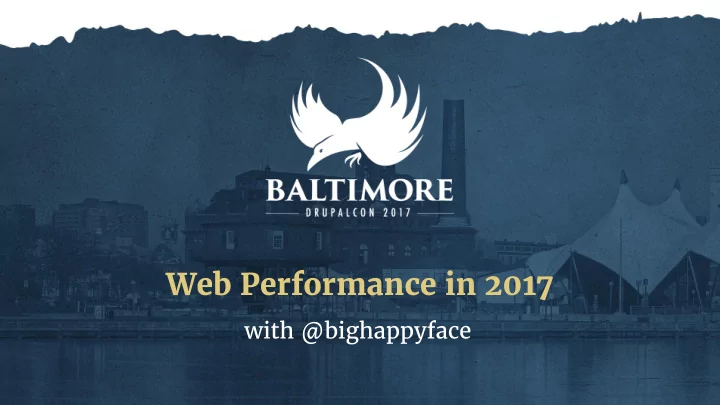

Web Performance in 2017 with @bighappyface
Big thanks to DrupalCon Team �
Big thanks to you � (it’s almost a wrap)
Please note ● This session assumes familiarity. I am speaking as if folks are already into this stuff. ● This session is marked as advanced. My apologies for casual techno-speak. ● This session is not exhaustive. I cover things that I think are interesting and important.
The plan 1. Measurement 2. Networking (HTTP/Browsers) 3. UI (HTML/CSS) 4. Code (JS) Q&A after each section to focus the interactions.
Measurement
Measurement IS performance
WebPageTest free and awesome
WebPageTest clear metrics and reporting
WebPageTest killer waterfall
WebPageTest recording!!!
WebPageTest very handy API
WebPageTest Some key metrics that are important to you. 1. SpeedIndex (calculated metric -- target < 1000) 2. First Paint (reported by browser) 3. Start Render (capture showing non-blank frame) 4. Visually Complete (a.k.a. End Render) 5. Document Complete Metrics (when the DOM is processed) 6. Fully Loaded Metrics (when all is said and done) https://sites.google.com/a/webpagetest.org/docs/using-webpagetest/metrics
Great WPT plug. What’s the point?
Metrics can be monitored Monitoring can be automated
Performance budget Budgets make it possible to set constraints and alert when thresholds are breached. It’s a really good idea. Some options: 1. WPT private instance with some automation 2. NPM packages (varying methods) 3. Services (dynatrace.com, webperformance.com, lots more) 4. Google PageSpeed Insights (API automation) 5. More that I am definitely leaving out Great information on this topic online.
Dev tools for measurement Chrome Audits Tab
D8 highlights for measurement My sandbox module
Q&A for measurement?
Networking (HTTP/Browsers)
HTTP/2 What’s new? 1. Binary instead of textual (easier to parse, more compact) 2. Fully multiplexed (parallel requests over a single origin connection) 3. Header compression to reduce overhead (HPACK, reduces round-trips) 4. Support for server pushes (proactive caching, good practices still TBD) https://http2.github.io/faq/
Headers Headers describe documents and heavily influence the browser. 1. Cache-Control (the big one) 2. Vary (rules for varying caches - encoding, cookie, user agent) 3. ETag (cache validation) 4. Cookies (heavy, large influence on cache) 5. Link (canonical/alternative URLs, Resource Hints - preconnect/prefetch) https://developer.mozilla.org/en-US/docs/Web/HTTP/Caching https://developer.mozilla.org/en-US/docs/Web/HTML/Link_types
Waterfall optimization know thy waterfall
Waterfall optimization Some tips: 1. Get requests for your domain to the top 2. Understand the impacts of DNS, SSL Negotiation 3. Understand how HTTP/2 vs. HTTP/1.1 waterfalls differ 4. Observe impacts of resource hints 5. Observe nuances of third-party drag Lots of guidance online.
Dev tools for networking Chrome Network Tab
D8 highlights for networking Resource Hints module
Q&A for networking?
UI (HTML/CSS)
Critical render path What’s a “critical render path?” Set of steps browsers must take to convert resources into a useable site. 1. Understand your resources and how they affect rendering. 2. Understand the waterfall (blocking/waits, order of load, options to inline) 3. Minimize critical resources (minimum CSS, JS, images, fonts) 4. Minimize round-trips https://developers.google.com/web/fundamentals/performance/critical-renderin g-path/analyzing-crp
Fonts Web fonts are the bane of performance. 1. Overloaded with glyphs, diacritics, metadata, kerning... 2. Too many formats (browser support concerns, Google Fonts tries to help) 3. EOT and TTF formats are not compressed by default 4. Font redraws and FOUC (flash of unrendered content) 5. Always blocks https://developers.google.com/web/fundamentals/performance/optimizing-cont ent-efficiency/webfont-optimization
Dynamic/transformative styling The future of CSS/styling? 1. PostCSS (transforming styles with JS) Note: Beware super-selectors (selector specificity) side effects 2. CSS containment (element isolation to improve layout recalculation) http://postcss.org https://developers.google.com/web/updates/2016/06/css-containment
Web Components Self-contained building blocks for building all the things. 1. Tech: HTML Templates, Shadow DOM, Custom elements and HTML Imports 2. Benefits: CSS scoping, DOM encapsulation, composition, isolation https://developer.mozilla.org/en-US/docs/Web/Web_Components https://developers.google.com/web/fundamentals/getting-started/primers/shad owdom
Dev tools for UI Chrome Timeline Tab
D8 highlights for UI Web Components module
Q&A for UI?
Code (JS)
JS Asynchronous/lazy loading Some key metrics that are important to you. 1. async script attribute (same as DOM script element injection) 2. Code splitting (webpack all day) 3. JS module loader (require.js, WhatWG proposals) https://developer.mozilla.org/en-US/docs/Web/HTML/Element/script https://webpack.github.io/docs/code-splitting.html http://requirejs.org/ https://whatwg.github.io/loader/
JS Transpiling and ES6+ browser support Modern JS and all of its goodness. 1. Babel, babel, babel 2. babel-preset-env (automatically determine the Babel plugins and polyfills you need - smaller artifacts) https://babeljs.io https://github.com/babel/babel-preset-env
General code performance 1. ASM.js (optimizable, low-level subset of JavaScript) 2. Slow code is slow code (measure complexity) http://asmjs.org/ http://bigocheatsheet.com/
Dev tools for code Chrome Profiles Tab
D8 highlights for code Drupal 8 is better for JS
Q&A for code?
Some thoughts
low performance high performance
Performance challenges (get out of your comfort zone)
Performance frustrates (progress comes slow)
Performance rewards (validation all around)
One more thing
2017.texascamp.org - June 2-4, 2017
2017.texascamp.org/submit-session (closes 4/28)
Join Us for Contribution Sprints Friday, April 28, 2017 First-Time Sprinter General Sprints Mentored Core Sprint Workshop 9:00am-6:00pm 9:00am-12:00pm 9:00am-12:00pm Room:309-310 Room:301-303 Room: 307-308 #drupalsprints
Locate this session at the DrupalCon Baltimore website: http://baltimore2017.drupal.org/schedule WHAT DID Take the survey! https://www.surveymonkey.com/r/drupalc YOU THINK? onbaltimore THANK YOU!
Web Performance in 2017 with @bighappyface
Recommend
More recommend